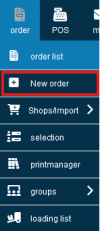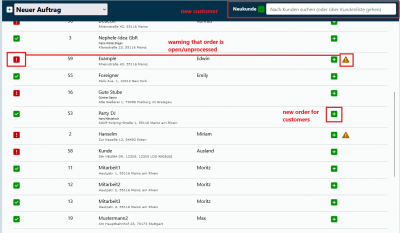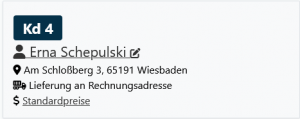En:New order: Unterschied zwischen den Versionen
Shari (Diskussion | Beiträge) (→Icons) |
Shari (Diskussion | Beiträge) (→Icons) |
||
| Zeile 98: | Zeile 98: | ||
When you have finished editing an order and want to prevent other employees of your company from accidentally making changes to the order, go to '''"Select further actions"''' and select '''Lock order''' <i class="fas fa-lock-alt navFont nr id=" sperre_auftrag"="" title="Auftrag sperren" fa-3x" style="color:#C60005"></i>. Conversely, you can also unblock the order again afterwards: <i class="fas fa-unlock-alt navFont ng id=" sperre_auftrag"="" title="Sperre aufheben" fa-3x" style="color:#029203"></i>. | When you have finished editing an order and want to prevent other employees of your company from accidentally making changes to the order, go to '''"Select further actions"''' and select '''Lock order''' <i class="fas fa-lock-alt navFont nr id=" sperre_auftrag"="" title="Auftrag sperren" fa-3x" style="color:#C60005"></i>. Conversely, you can also unblock the order again afterwards: <i class="fas fa-unlock-alt navFont ng id=" sperre_auftrag"="" title="Sperre aufheben" fa-3x" style="color:#029203"></i>. | ||
=== Customer === | |||
[[File:Kundeninfo.png|300px|thumb|right|Customer information]] | |||
Under the icons you can recognise the customer number, name, billing address, delivery address and price group of the customer. By clicking on the customer name, it is now also possible to go directly to the customer index card. Below this is the free text field for individual notes, which you can easily maintain in the order. You can display the price group by clicking on it again. The price category influences which price is automatically preselected for this customer. If the item does not have a price in this price category, the first price category is automatically selected. In this case, a short message about this process appears. | |||
There is also a note below this if the customer is in arrears with payment. | |||
Version vom 2. Oktober 2024, 08:40 Uhr
| How to find this page: |

|
Create a New Order
Order List
In the main menu, select under Order - New Order. Here, you will see an overview of all customers with a search field. Now, select the customer for whom an order is to be created by clicking on the Plus icon. You will then be automatically redirected to the page to edit the order.
To find your customers more quickly, you can search for them instead of having to scroll laboriously through the list. If the customer does not yet exist, you can click the green Plus icon next to the search bar to directly create new customers.
If only one customer remains in the list of search results, pressing the ENTER key is enough to create an order.
Customer File
Of course, this is not the only way to create a new order.
You can also create a new order directly from the customer file, allowing you to continue working in the program from wherever you are. Here, you can click on the green paper with the green Plus icon and create a new order.
Customer Selection
Through customer selection, you can also create new open orders in bulk for all selected customers in the third step under the "Order" tab.
Convert Reservation to Order
Another option is to convert reservations into orders. This can be done from the customer file under the "Reserv." tab or from the reservation module.
Editing Mask
When you have created a new order, the program automatically switches to the order editing mask, where you can set all the details.
How to edit an order can be found in this article.
Import Order
You can import an old order into a new one using the drop down menue.
This feature is useful if customers want to order the same goods they purchased from your vinotheque six months ago.
However, not only can orders from the same customers be imported, but also from other customers. For example, I, as your customer, can request the same order as customer Jamie Doe, and you can easily search for that order and import it.
Copy order
If you would like to create the same order for other customers, you can assign an old order to new customers by clicking on the icon copy order and duplicate it. Only the modalities of the order are copied. The customer file of the original order remains untouched. The new duplicated order can therefore only be assigned to existing customers by clicking on the orange icon with the two sheets of paper.
Explanation Video
We also have a video for this article that clearly explains the topic.
More about the order editing function can be found here Auftrag bearbeiten
Overview of the order mask
The Winestro.Cloud order screen offers a wide range of options. For this reason, we have mentally divided the screen into three areas (left, centre, right) for a clear explanation, as you can see in the graphic. In the following description, we will work our way through the screen from left to right.
left block
Icons
Loading files into a customer file
to the booking calendar
Create new task
Checkout
Send receipts to customers by e-mail
Send all previously created receipts by e-mail
Send dispatch notification via e-mail
Send order confirmation via e-mail
for incoming payment control
Adapt order data to current customer and system data
Select further actions
Import order
copy order
Sometimes it is necessary to copy orders and recurring business transactions from customers. To do this, go to the index card of an order and select the copy symbol . You can now specify which customer the new order should be assigned to. The new order is only copied with the article information. Invoices and all other documents must be created again.
Block order
When you have finished editing an order and want to prevent other employees of your company from accidentally making changes to the order, go to "Select further actions" and select Lock order . Conversely, you can also unblock the order again afterwards: .
Customer
Under the icons you can recognise the customer number, name, billing address, delivery address and price group of the customer. By clicking on the customer name, it is now also possible to go directly to the customer index card. Below this is the free text field for individual notes, which you can easily maintain in the order. You can display the price group by clicking on it again. The price category influences which price is automatically preselected for this customer. If the item does not have a price in this price category, the first price category is automatically selected. In this case, a short message about this process appears. There is also a note below this if the customer is in arrears with payment.




